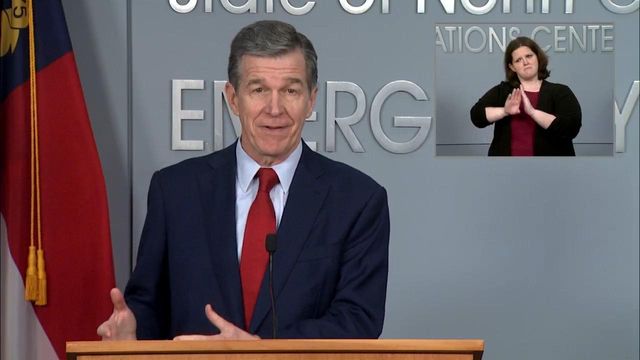'The worst is behind us': 2 years in, Gov. Cooper says COVID won't disrupt NC
Gov. Roy Cooper on Thursday told North Carolinians he believes the worst of the COVID-19 pandemic has passed, leading the state to change how it tracks and reports coronavirus-related data.
Posted — UpdatedGov. Roy Cooper on Thursday told North Carolinians he believes the worst of the COVID-19 pandemic has passed, leading the state to change how it tracks and reports coronavirus-related data.
"We can look forward with the belief that the worst is behind us," Cooper said during a news conference. "Now we enter the next phase. One of individual responsibility, preparedness and prosperity. It's time to chart the new course. This virus will still be with us but it won't disrupt us."
Cooper's words came exactly two years after he announced a closure for the state's bars and restaurants, allowing them to only offer take-out service. In recent weeks, many towns, counties, school districts and municipalities have lifted requirements for mask-wearing.
Cooper said the State of Emergency order will not be lifted at this time as the state uses the order as a tool to provide flexibility for hospitals for possible surges in the virus. Even as the state steps down its monitoring, Cooper said the state will increase its response again if needed, adding that it's crucial to remain prepared and a cut in federal funds could make that hard.
"Federal investment keeps the production of tests and treatments high, which is what we want," Cooper said. "We've seen how fast a surge can come so we have to be ready."
Cooper said he and other governors are pushing the federal government to continue funding monoclonal antibodies and other therapies for states to stockpile.
Kody Kinsley, the Secretary for the North Carolina Department of Health and Human Services, announced the new ways the state will monitor COVID in the future. The state will no longer put out daily data, opting for updating data through its dashboard on a weekly basis. The new methods include observing wastewater surveillance, booster rates, hospital admissions and COVID-like illness rates. State health officials will still follow trends for data.
Back in January, during the omicron surge, Wake County was offering 8,000 testing appointments each day to meet the demand. Beginning Thursday, only 1,900 appointments will be offered daily.
The state on Wednesday reported 1,519 new coronavirus cases, the highest number this week but less than the daily totals reported months ago.Around 800 people are hospitalized with coronavirus in the state, the fewest since July 21.
Also on Thursday, the Centers for Disease Control and Prevention will release new COVID-19 data showing community transmission levels. At the beginning of March, much of North Carolina was considered to have a high risk of transmission. Much of the state is now in green – or at a low risk.
Only Ashe County is listed as "high" risk, and Wayne and Sampson counties are two in our area at "medium" risk.
In Wake County, more than 80% of people five and older have received at least one dose of the vaccine, one of the highest percentages in the state.
Many communities and school districts across the state and the Triangle have dropped their indoor mask mandates, although masks are still required in Durham Public Schools. In Chapel Hill-Carrboro City Schools, the indoor mask mandate will be rescinded April 4.
Related Topics
• Credits
Copyright 2024 by Capitol Broadcasting Company. All rights reserved. This material may not be published, broadcast, rewritten or redistributed.






